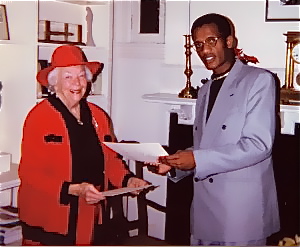Program History
The Alfred Friendly Press Fellowships were born in a goose blind on Maryland’s Eastern Shore in the winter of 1983.
Waiting for the geese to come in range, Alfred Friendly, the Pulitzer-Prize winning Washington Post journalist, started talking with his son, Jonathan, about his desire to “do something” for the profession that had been so good to him. He said he wanted to set up a small foundation but wasn’t yet sure what it should do.
Jonathan, then a reporter for The New York Times covering the press in America, pointed out the then-current discussion in the United Nations Educational, Scientific and Cultural Organization (UNESCO) about a “New World Information Order.” Both men agreed that the label was, in many instances, a thinly disguised excuse for censorship by dictators who didn’t want Western news agencies reporting on their oppressive ways. But they also agreed that the Western press had notably failed to offer a helping hand to journalists in what were then called “developing countries.”

Jean Friendly and her five children board a plane for France in 1948. Bottom row: Nick, Victoria, Lucinda. Top row: Alfred Jr., Jean, Jonathan
Al and his wife Jean were widely traveled and deeply interested in the world outside the United States. They also had a lifelong commitment to education.
What emerged was a unique program, centered on training journalists in US newsrooms, a direct professional-to-professional experience that didn’t depend on governments or other outside agencies.
Within months, Al, though dying of cancer, established the foundation that bears his and Jean’s name and hired an executive director for a program he named the International Press Fellowships. The director, David Nalle, was a retired USIA Middle East specialist who shared Al’s belief in the responsibility of the West to assist nations emerging from colonialism.
Joined in Washington by Al’s eldest son, Alfred Jr., they set about defining a program, advertising for applications and lining up newspapers to serve for six months as hosts to the ambitious young journalists. Within months, they had put all the essentials in place for a group of a dozen fellows who would arrive the following spring.
Sadly, Al did not live long enough to meet that first class. He died in November of 1983, just shy of his 72nd birthday.
| Over time, Friendly Fellows made their mark here in the United States and then returned home to take back what they had learned. Click here to view program’s impact. |
When the first class of fellows arrived in 1984 to spend two weeks in Washington and then five and half months working at newspapers and news magazines around the country, it was a fairly prosperous time for the newspaper industry. News giants such as James Naughton of The Philadelphia Inquirer, Tom Winship of the Boston Globe, Ben Bradlee and Len Downie of The Washington Post and Burl Osborne of The Dallas Morning News welcomed the fellows to their newsrooms.
Even smaller papers joined up; Brandy Ayers’ Anniston (Ala.) Star was a fine example of the commitment to a forward-looking international effort. Al’s guiding principle that journalism was better learned on the job than in the classroom had come to fruition.
While reporting overseas, Al found that many American readers – and some journalists, too – needed to see how international events large and small connected to their own. Nepali journalist Bijay Lal Shresta, found connections between Anniston, Ala., and Kathmandu, Nepal. It was a two-way street. Both sides benefited – the journalists who came and those who mentored and worked with them.
| To read more about the program’s evolution, |
After the fall of the Berlin Wall in 1989, the program, under Nalle’s successor, Susan Talalay, began to recruit fellows from Eastern and Central Europe. Many of these returned home and become stringers for U.S. publications. Jasmina Kuzmanovic was back in the former Yugoslavia during the siege of Sarajevo and provided reports to her host newspapers, USA Today and the Nashville Tennessean.
 In these years U.S. newspapers were financially stretched; many were closing overseas bureaus. The Friendly Fellows were filling a void. The program was building momentum.
In these years U.S. newspapers were financially stretched; many were closing overseas bureaus. The Friendly Fellows were filling a void. The program was building momentum.
As needs changed, some fellows focused primarily on a single beat, such as business or science, but for the first 10 years, the majority of fellows would be placed at different departments at their host newspapers to learn how to cover a variety subjects and improve their overall journalism skills.
In the last decade the program has expanded its training to include computer-assisted reporting and digital reporting. More changes are on the way with the Alfred Friendly Press Partners emphasis on continuing relationships with the most ambitious newsrooms around the developing world.
The geese got away that morning in Maryland, but the idea that was hatched there remains as vital and useful as ever.

